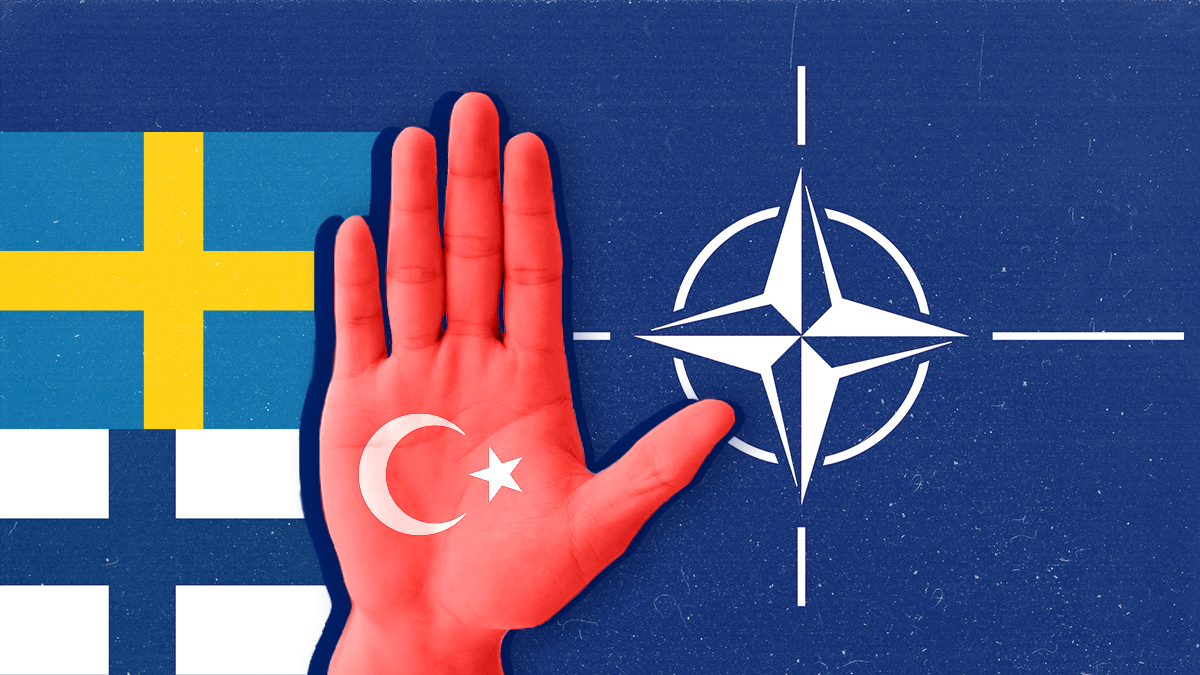It’s been over a month since Finland and Sweden applied to join NATO. But despite expectations of a speedy process, the joint bid has been met by an unexpected and troublesome obstacle: Turkey.
Historically, applications to NATO have been very smooth, as with many Eastern European countries in the 2000s; or they can be complicated and unyielding, as with Ukraine. But this time, Helsinki and Stockholm face just one skeptical member armed with a list of demands and that all-important veto power.
From reassurances that it wouldn’t “close the door” to the two Nordic countries joining the alliance, to concession requests, and even threats of delaying the accession for up to a year, Ankara’s foreign policy seems a tad all over the place.
Now, less than a week away from the NATO summit in Madrid — where many believed the Swedes and Finns would formally join the alliance — one can’t help but wonder: what the heck is on Turkey’s mind?
Ankara’s demands. When Turkey first raised its objection, many onlookers assumed it was all about optics, with President Recep Tayyip Erdoğan playing to his base to rally domestic support ahead of next year’s national election.
But the Turks say they want:
- Sweden and Finland to treat the Kurdistan Worker’s Party like the Islamic State
- For the Finns, Swedes, and a few other European states to lift a 2019 arms embargo over Turkey’s military intervention in northern Syria
- The extradition of some 30 alleged terrorists residing in Sweden
Erdogan’s motives. Really at the heart of what Turkey is asking for are calculations about its strategic and domestic interests, says Emre Peker, a Europe Director at Eurasia Group.
“Any government would push for similar concessions, maybe just in a more diplomatic, behind-closed-doors manner,” Peker says.
Sure, Erdogan wants to win at home, and his grandstanding is part of that push. “But he’s not motivated purely by domestic politics,” Peker says. It’s a reflection of his long-running focus on NATO behavior and security concerns, particularly regarding the Kurdish YPG militia in northern Syria.
While Turkey can’t get the US or French to drop their support for the YPG, Ankara “does have the leverage to push would-be NATO members to accept [its] security concern before joining the alliance.”
But it’s a delicate dance. Although pushing allies to fully consider Turkey’s security contract is one thing, Turkey can’t isolate itself within NATO without suffering “grave security, defense consequences,” Peker adds.
Long-term grievances. Erdogan’s PKK shenanigans have a lot to do with national security. Not only is Turkey hosting 3.6 million Syrian refugees, but the tensions along its shared border and the Kurdish-held region are far from resolved. Just last week, Turkey started planning a military operation in Syria against the Kurdish-led Syrian Democratic Forces.
Possible wins. While the Turkish president can’t really afford a fight, he can certainly use a victory. The self-serving reality of this push could help Erdogan build a success story in foreign policy, framing himself as a negotiator on the world stage.
“Ankara is trying to position itself as a nominally neutral country that can also act as a mediator between Ukraine and Russia,” Peker says.
Possible losses. As the war continues in Ukraine and NATO members grow increasingly frustrated with Turkey blocking accession, Helsinki may find itself being collateral damage.
For now, the Finns are trying to talk things out with the Turks to resolve the situation without delay. But the real beef is with Sweden, which has had a strong bond with the Kurdish cause and is home to a far bigger Kurdish community than Finland.
“The real problem remains between Turkey and Sweden,” says Peker, and it is now up to these two players to “iron out their bilateral issues.” If they don’t, Finland, the country with the most to lose as Russia’s next-door neighbor may be stuck in the crossfire … and outside the alliance.
